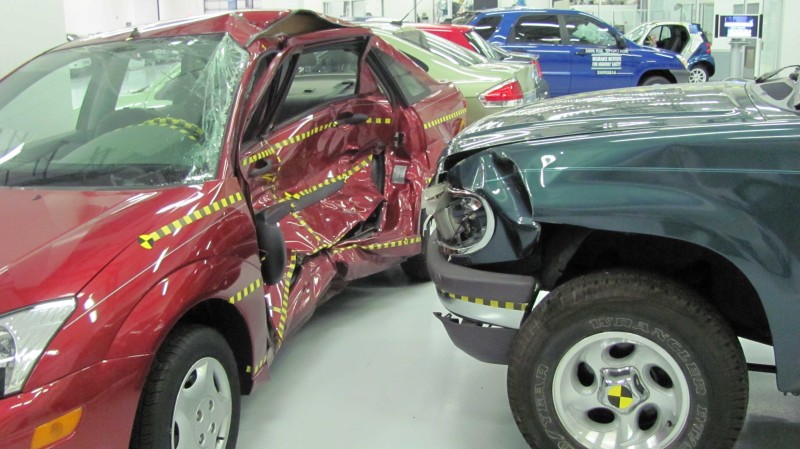
It’s no secret that North Americans, including Canadians, prefer large vehicles, like SUVs and pickups, to smaller ones, like compact sedans or minis. Our analytics data seems to confirm this since Honda CR-V, Honda Pilot and Toyota Highlander are some of the most searched new vehicles on Unhaggle.com. Many argue that one of the key reasons for the popularity of big vehicles is that they are safer, but we wonder if that’s actually true.
Alexandra Straub, a car expert and a contributor at Wheels.ca and DrivewayCanada.ca, shares her thoughts with us on this matter.
First and Foremost… Physics
So, why would anyone be afraid of small cars? In short: physics. According to a study by the Insurance Institute for Highway Safety, vehicles like the Honda Fit, Smart Fortwo and Toyota Yaris may perform well in the frontal offset barrier test, but all three fail to properly withstand frontal collisions with midsize cars.
The IIHS points out that size and weight play a particularly big role in determining how much damage a vehicle can take upon impact. The unfortunate truth is that the larger and heavier vehicle will always push the smaller and lighter one backward during a crash. This results in a smaller impact on the passengers of the bigger vehicle and a greater impact on the occupants of the lighter vehicle. As a consequence, people in smaller, lighter cars are more likely to receive injuries.
It’s a cold truth that’s hard to walk away from since the laws of physics are beyond human control. Does this mean that we should all just buy SUVs in order to stay safe then? Alexandra Straub belongs in the camp that would strongly oppose such a notion.
“Some cars physically are smaller than others, but that doesn’t mean they’re not safe,” she says. “There are plenty of examples of small cars being involved in really bad crashes and the occupants walk away unscathed.”
So, is Straub arguing against the IIHS or the laws of physics in general? While it may seem that way, her point is that due to their vulnerabilities, small vehicles are far more rigorously tested than their larger siblings.
“Canada has very stringent crash test standards to allow small vehicles on the road, so those driving a smart, or Ford Fiesta, or Nissan Micra, etc. can rest assured that if they are involved in a crash, they’ll be as safe as they possibly can be,” she says. “Of course there is truth in crash tests and the data collected is for the benefit of the public. Though, I’d argue that the ultimate safety tool is defensive driving. That has no bearing on the size of a vehicle.”
Do Customers Even Care?
Safety is arguably one of the biggest reasons to purchase a large vehicle, but how important is this reason when compared to other considerations?
“There’s a perception that bigger means safer,” says Straub. “To an extent, it can be true. But a large vehicle can flip, turn or crash into objects like any other car on the road. Occupants can get injured or even die.”
Despite the prevalence of the preconception that bigger is safer, Straub is not convinced that it’s the main reason why people buy SUVs and similar big vehicles.
“I think the main reason why people buy an SUV is because they need utility,” she says. “And, for the most part, they are equipped with all-wheel or four-wheel drive. Buying an SUV for the safety factor is a somewhat dated mentality, though it’s still prominent.”
She further points out that there are many other arguably more important reasons to pick a certain vehicle than size.
“There are plenty of great vehicles on the market that are IIHS Top Safety Picks that aren’t SUVs,” she says. “People will buy a vehicle based on their commuting needs, and how much space they require, as well as price. Not to mention styling and how it looks.”
Straub posits that at the end of the day SUVs and many other large vehicles are more about interior space than anything else. Hard to argue with that.
Reasons to Buy Smaller Vehicles…
If large vehicles are more spacious and arguably more safe than their smaller counterparts – at least as far as customer perception goes – why bother buying a small car at all? Clearly there is a market for them, but who exactly would buy a small vehicle and why?
“Price is a major reason why people buy smaller vehicles,” says Straub. “Because it has a lower starting MSRP, you can get more options for the same price as a bigger vehicle in base form. Fuel economy also factors in.”
Straub’s ideal vehicle size? Compact, compact crossover, hatchback or wagon.
“I lead an active life so I need a vehicle that allows for my roadbike to fit inside,” she says. “I also like smaller vehicles for an urban setting. At this point in my life, I don’t need a lot of cabin space.”
To find the price on your ideal vehicle – whether size matters to you or not – check out Unhaggle.com.






